astrology archives // musings of a mercurial ninth houser // 777 // ♓︎☉ ♍︎☽ ♊︎↑
Don't wanna be here? Send us removal request.
Text
A breakdown of the meaning behind Elements in Astrology
THIS IS PART ONE OF MY SERIES OF HOW THE ELEMENTS, TEMPRAMENTS, PLANETS AND SIGNS ALL CONNECT. This first post will tackle the elements and temprament.
We all know that: Fire sign = Aries, Leo, Sag Air sign = Libra, Aquarius, Gemini Water sign = Cancer, Scorpio, Pisces Earth sign = Capricorn, Taurus, Virgo Further, that: Fire + Air = masucline/yang elements Water + Earth = feminine/yin elements
The relationship and meaning behind what it means to be of said element or such goes a lot deeper, however. To understand this we need to look at the primary qualities of these elements and tempraments (sanguine, choleric, melancholic, phlegmatic).
So, I want to essentially regurgitate my notes on the link between elements, tempraments, planets, and signs. You cannot understand one without understanding the others. Grasping these fundamentals will help in delienating charts better as you'll know more about how the signs and planets function. This requires unlearning a lot of modern/pop astro rhetoric though, as some things may not initially make sense or are 'unrelatable' (an unreliable, poor metric of accuracy in the first place) . This does not make traditional information false - just that a different frame of perspective is needed to understand and synthesise the information for charts. Pretend you know nothing about astrology and start from the very bottom up - its foundations - and keep an open mind; this is merely a stepping stone guide into broader delineation practices.
∘₊✧──────✧₊∘∘₊✧──────✧₊∘∘₊✧──────✧₊∘
All the information below comes from Avelar & Ribeiro's 'On the Heavenly Spehres' which I have split into: I. The Primary Qualities, II. The Elements, and III. Tempraments (and how to calculate it). Parts written in "((...))" are my own thoughts, and part of the Tempraments section is from Greenbaum's 'Temperament: Astrology's Forgotten Key' instead. Buckle in because this will be long af teehee. (I directly quote from these books but have formatted the information in note form to be more accessible and also made it way more succint.):
I. The primary qualities
✦ The 4 elements (building blocks) of the universe are composed of four fundamental principles, or primary qualities. These are: hot, cold, dry, and moist. These qualities represent energy, density, resistance, and malleability. ✦ It is their combinations which define the four elements and the nature of planets and signs.
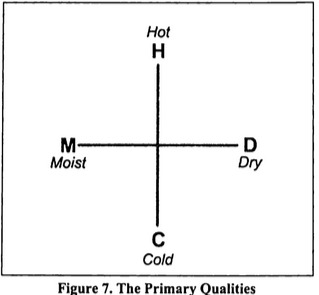
✎ It all starts with Hot and Cold:
Hot: symbolises energy; what is active, radiant, centrifugal, luminous, light, and subtle. It is a masucline quality, meaning expansive and dynamic. The masucline principle represents activity, dynamism, exteriorisation and expansion. Cold: symbolises what is static; absorbent, centripetal, dark, heavy, and dense. It is a feminine quality, meaning contracting and static. The feminine principle corresponds with receptivity, contexmplation, internalisation, and contraction.
✎ The universe is shaped by opposing forces—light and dark, expansion and contraction, movement and stillness. This interaction between hot and cold generates two more poles: moist and dry.
Moist: symbolises fluid interaction. It is generated from the quality of cold, since an increase in coldness results in humidity (e.g. cold nights -> condensation). Represents: adaptability, malleability, plasticity, smoothness, and therefore things that are easily molded, slippery, and soft. It has no form in itself, but represents cohesion. Dry: symbolises tense interaction. It is generated from the quality of hot, since an increase in heat results in dryness (e.g. leaving things out to try in the sun). Represents: resistance, hardness, rigidity, and therefore things that are abrasive, breakable, and cold. It is the maintenance of form: containing, giving structure, and crystallising. Because M + D are generated from active qualities, they are cllaed passive qualities. They are connected to the concept of form (e.g. clay is malleable when moistened, but hardens when dried in an oven).
II. The Elements
╰┈➤ Each element is composed of two primary qualities: an active + a passive.
Fire = hot + dry. It is expansive, radiant action (hot) that imposes itself naturally without molding itself to the external environment (dry). Air = hot + moist. Dynamic (hot) but adaptable (moist). It is characterised by dispersive activity, adaptability, and changeability. ೃ⁀➷ They both share a hot quality and are therefore both masculine, dynamic, and extroverted ((energetically external, does not mean YOU are extroverted though)). They have a strong a strong centrifugal impulse (exteriorising). Earth = cold + dry. It is contracted , inert (cold), hard, and non-moulding (dry). Water = cold + moist. It is receptive and dense (cold), but extremely malleable (moist). ೃ⁀➷ They are both cold and are therefore feminine, reflexive, and introverted (energetically internal). They have a receptive and centripetal motion.
╰┈➤ The elements can also be grouped according to their passive/secondary qualities (as dryness and moistness come from hotness and coldness).
Fire and Earth both share a dry quality, giving them a tense, resistance, and non-molding expression. ೃ⁀➷ Fire resists by imposing its radiance; consuming and burning what it touches, but also illuminating, energising, and transmitting its heat to everything. Earth resists through its presistence, its premanence. It is immovable, creating obstacles but also providing structure, cohesion, and stability. Air and Water both share a moist quality. They are malleable, changeable, and adaptable. ೃ⁀➷ Air expresses this malleablity in an active manner, expanding freely in any direction. Water expresses itself in a more retracted manner; it molds, absorbs, infiltreates, and dissolves structures.
╰┈➤ Extra tidbit: The four elements are arranged in sublunar spheres ((this concept comes from Aristotle and Ptolemy, which divided the cosmos into the ever-changing realm below the moon aka our planet earth, contrasting with the perfect unchanging celestial realm above)) by density.
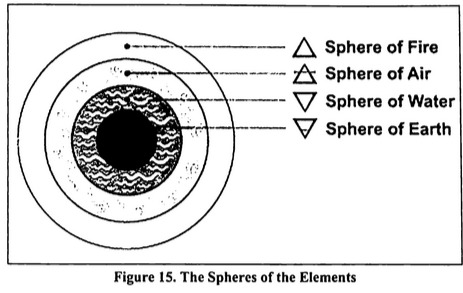
Earth: the densest, forms the central sphere. Due to its gravity (weight), it represents all that tends toward static permanence (e.g. a rock). It maintains fixed and structured forms, crystallises and turns substances hard, giving them permanence, durabiltiy, and stability. Continents. Water: less dense than earth. Although dense (cold), its moistness gives it plasticity and adaptability. It makes dense materials pliable and prevents obejcts from becoming dry/brittle with its adhesive propeties. Represents all bodies of water. Air: lightness + penetrability, great mobility and plasticity. Like water, it has a unifying role, though more subtle, and is associatived with transporation, (such as of smells and sounds as done through the air). Fire: the most subtle element as it is the outermost sphere. Its presence is detected through its qualities of luminosity, heat and 'electricity'. Drives energy exchange, creation, and vitality.
╰┈➤ Everything contains all four elements in varying proportions. Each planet and sign is linked to a specific element; planetary movement/celestial configurations are interpreted from the perspective of the movement and thus the combination of elements. Elements bridge terrestial events and celestial reality.
╰┈➤ ((Primary qualities therefore help us understand the THEMES of an element. There are a lot of buzzwords when trying to describe planets/signs (will be in my part 2 post), but it is important to remember their composition to better interpet them.))
III. Tempraments
Fire: choleric Air: sanguine Earth: melancholic Water: phlegmatic
✎Ancients defined tempraments as the complexion of an indvidual: their physical and behavioural traits, as well as psychological and metabolic predisposiitons. ((planets + signs also have tempraments which I will go into in part 2, this part is talking about overall temprament of the nativity, however.))
✎Each person will have a predominant temprament, but the remaining 3 are also present in their constitution, in smaller varying proportions.
(( N.B. Greenbaum (in her book , Temperament: Astrology's Forgotten Key) agreeably describes temprament as a person's inherent nature/disposition. This is NOT personality. It highlights the core characteristics that condition a person's behaviours, motivations, and personal dynamics - their character as a broader concept. Greenbaum also suggests (as do many other hellenistic authors) that the personality of a person is a mix of their ascendant, planets in the 1st house, lord of the ascendant, moon, and mercury. There is an issue of people thinking all the planets/signs are them and their personality, and falling into a sort of self-fulfilling prophecy of, subconsciously or not, acting like what they think their chart means vs what it actually does...especially under the misunderstanding of what the planets and signs mean - a double homicide issue if you ask me. I'll write another post on how sun sign and etc are not 'you' yourself. Astrology is not so wholly centred on or concerned about a psych evaluation lol. Temprament, however, is the first step in understanding the blueprint of the person. Greenbaum argues that things like planets or aspects to the ascendant in affecting 'personality' are accidental to the individual rather than essential. She explains this in deeper detail in her book. IMO, temprament therefore just provides a rough basic idea; the clean slate/blueprint, it will not give you the complete picture of one's personality. The things that define that are factors beyond what is just essential to our makeup. For example, I bake a lemon drizzle cake. It is essentially a lemon drizzle cake because of its composition. Realistically, though it has many more particular quirks and features which makes it different to other lemon drizzle cakes and adds more nuance)).
✎ Calculating temprament (YOU NEED AN EXACT BIRTH TIME FOR THIS):
- There are several methods, e.g. the one given in this book or the one in Greenbaum's book mentioned above (can find both online as a free pdf). I prefer Greenbaum's method (I think it is more accurate, and her book in general on Tempraments holds a lot of authority and solid reasoning) so I will be using that. Either way, just remember not to include the outer planets, and especially not as rulers (I'll write a separate piece on the benefits of using traditional rulers and why I ditched modern rulerships another time) Greenbaum's method: ((BTW you might need to know whether your mercury and venus are oriental or occidental for this, i.e. whether they are rising before/behind the sun (OR) or after/in front of the sun (OC). This can be confusing to do sometimes so the easiest way is to imagine your sun as the asc point and simply see what planets are above it and the dsc axis (those are OR), and below it (OC). Heres a guide i made:
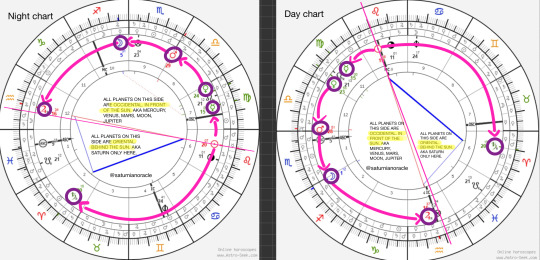
✎These charts are of the same birthday but born at diff times (night v day) to demonstrate how to find oriental and occidental planets. The easiest method however is to just imagine your sun is in the 1st house/asc instead:
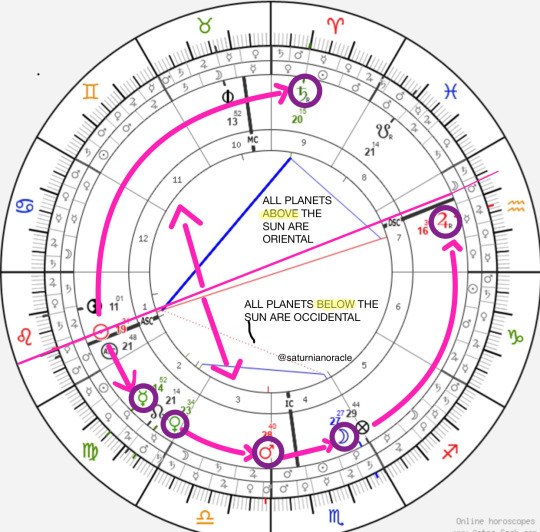
✎ Say the original chart is the night chart, it is clearly a lot easier to pretend/shift the sun into the ascendant position to easily see planets above (oriental) and below it (occidental). Remember to mark the opposition from the sun's position precisely degree wise. Otherwise, for example, you could mistake jupiter in the chart above as being oriental instead of occidental. ))
STEPS (cheat sheet pic further down): 1. The rising sign by element (2 points for the temprament it falls under. E.g. leo rising = fire sign = choleric gets 2 points) 2. Moon sign by element (2 points. E.g. Taurus moon = earth = melancholic) 3. The season you were born in (2 points. Sanguine is spring, Choleric is summer, Melancholic is autumn, Phlegmatic is winter.) 4. 1L/Ruler of the ascendant by intrinsic quality, aka planet (1 point. E.g. leo asc = ruled by sun = 1 point for choleric ) ✎ IMPORTANT: If the planet is mercury or venus: they are BOTH SANGUINE WHEN ORIENTAL in your chart, when OCCIDENTAL - Venus is PHLEGMATIC and Mercury is MELANCHOLIC. 5. Ascendant almuten by intrinsic quality (1 point. This is the planet with the most essential dignity at any degree of the zodiac.). (( USE A DIGNITY TABLE: ✎E.g. Aries rising 28 degrees. Take the sign of Aries and calculate its possible dignities, aka hypothetical, aka not where the planets are in your chart (domicile is 5 points, exaltation 4, term 2, triplciity 2, face 1) . THEREFORE from the dignity table we can see that : Aries' Domicile is mars = 5 points, Exaltation sun = 4, Term saturn (28 degrees) = 2, Triplicity is the sun in a day chart = 2, Face venus (28 degrees) = 1. The almuten of the asc is the Sun because 4 + 2 = 7 points for the sun = choleric. )) ✎ IMPORTANT: If your asc almuten is mercury or venus: they are BOTH SANGUINE when ORIENTAL, when OCCIDENTAL - venus is PHLEGMATIC and mercury is MELANCHOLIC.
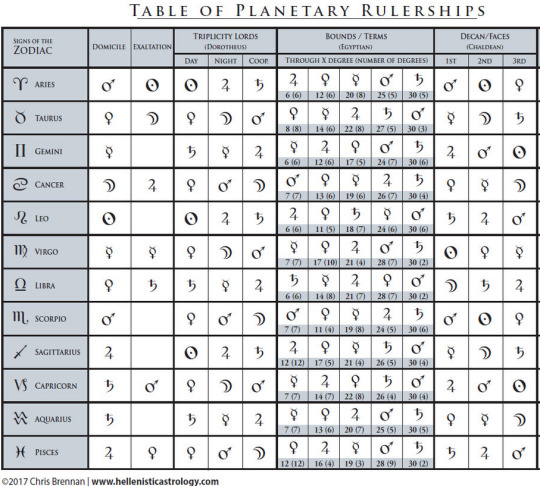
6. Ruler of the moon by sign ( 1 point. i.e. its dispostier. E.g. moon in taurus, taurus ruler is venus in aries = choleric 1 point) 7. Moon phase (1 point. see table below). Greenbaum provides a cheat sheet here and an example of scoring:

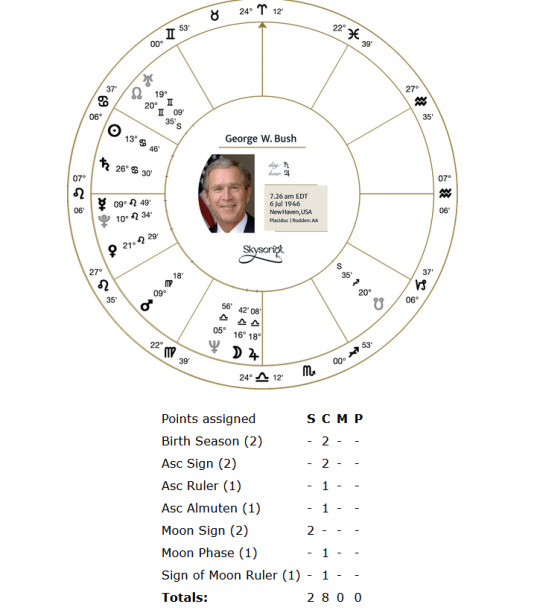
╰┈➤ THE TEMPRAMENTS (back to OtHS):
✎ Choleric:
- Hot + dry (fire). Enthusiastic, energetic, rapid actions. - Produces resolute, courageous, and ambitious people, ready for action, enterprising, enthusiastic. Does not give up easily. Leadership + strong will. - Can change their mind frequently, start several projects in life. But enthusiasm is not necessarily lost. The focus is action and conquest, details cannot deter them. -Can be precipitated and inconstant. Impatient and not academically/investigation inclined. - Not overly emotional, 'dryness' may cause rigidity and insensitivity. Impatience may cause a lack of grace which may be rude or hostile. - Reacts intensely to threats/external challenges. In extreme cases, their insensitivity and easily expressed rage can result in cruelty. - If the choleric's secondary temprament is melancholic, they may be more moderated in actions. This combo is predominantly dry, indicating a tendency to retain ire, and a tendency for mistrust or bad temper. Has greater emotionaly constancy, curiosity, and capacity for study as the melancholic coldness moderates the choleric's heat. - If it is phlegmatic, this cools the constant activity and impulsive reactions as it involves a mixture of complimentary primary qualities (hot and dry , but also cold and humid). Has greater range of emotional reactions, generating contradictory attitudes. - If it is sanguine, they will be lighter and more sociable, attenuating their cholericness. More sensible and adaptable (humidity moderates the harsh dryness), but as they both have hotness, there is agitation and inconstancy. Physically: cholerics are slim, muscular, hairy. Average frame or short. Coarse skin, hot, and shiny, of a yellow/reddish tone. These traits may be modified by other tempraments. In physiognomic terms (humors and stuff) associated with yellow bile which is centred in the gall bladder. Used to process the remaining humors; confers movement and actions and heats the body.
✎ Sanguine:
- Hot + moist (air). - Similarly to choleric they are dynamic and active. Moistness makes them more versatile and adaptable. Vivacious, spontaneous, enthusiastic, and very communicative + sociable. - Have many interests. When properly tempered, they are curious, studious, and inquiring. - Emotionally very sensitive . Does not harbour anger easily, naturally happy and friendly. -Exteme fluidity can lead to dispersion, lack of concentration, lack of perseverance. Negative aspects include lack of organisation and dicipline, unsettled, and restless. Immense sociability may also cause superficiality and futility. - Melancholic as the secondary temprament: their dynnamic and changeable nature is more structured and consistent. Their vivacity and joy becomes more contained and the person is more serious or conservative. Balanced combination due to contrasting primary qualities (hot and moist v cold and dry), well suited to study and investigation. - If phlegmatic: dissolution of sanguinity. Its coldness makes the person less exuberant/happy, more self-oriented yet still changeable and adaptable due to their shared moistness. - If choleric: intense and bellicose with loss of natural flexibility (due to predominance of hotness). Yet, the dryness confers greater determination and perseverance to the sanguine's actions. - Physically meaty and full but not fat. Robust frame, medium height to tall. Smooth skin, hot and moist to the touch with white or rosy hue. Associated with blood. This humor eliminates and transports substances in the body.
✎ Melancholic
- Cold + dry (earth). - Reflective and focussed. Reserved and moderated, tendency to be underestimated and seen as uninterested in things. - Focuses on objective reality as it provides a sense of firmness and security. Deals better with facts than ideas, resourceful, a good investigator, has a lot of patience and perseverance. - Not very outwardly emotional, rigid in sensibilities (like choleric). Its coldness, however, makes them especially susceptible toward pessimism and depression. Their dryness results in difficulty crying, can retain anger for a long time to the point of resentment. - Rigidity can make them obstinate, distrustful, anti-social, loneliness. Critical and a perfectionist. Extreme cases = intolerant and cold hearted. - Sanguine as the secondary temprament: more sociable, bold, joyful, less pessimistic and defensive. Measured combo. - If choleric: greater vitality, sociability, determination. But predominance of dryness confers a solitary and individualistic attitude. - If phlegmatic: the predominance of coldness reinforces reservedness and withdrawal. Similar behaviour to a pure melancholic type , but more flexible and adaptable. -Physcially: medium frame and slim. Coarse skin, cold to touch, yellowish or dull colour, spare hair that tends to be dark. Associated with black bile. Function is retaining substances in the body, bestowing consistency to muscle tissues and liquids, solidifying the bones, strenghtening memory and sobriety. Containing organ is the spleen.
✎ Phlegmatic
- Cold + moist (water). - Sensitive, reserved, powerful emotional drive, making decisions help maintain security and emotional wellbeing, introverted. Moistness confers plasticity and adaptability. - By favouring emotional reasoning, they can be subjectvie and inconstant to the point of incongruence. Interested in what they feel and in what promotes seucirty, love new people and new situations, can easily adopt a passive and slightly lazy attitude. Timid and serene. -Very emotional but seldom openly expressed. Senstive and sympathetic, avoids commitments and not v expressive. Tends to assume conciliatory roles and is excessively patient. When emotionally disturbed , they can become reclusive and apathetic. Excessive malleability can cause extreme laziness and indolence. - Has difficulty disaplying courage and determination. Extreme case = their emotional self-centredness lads to greed, cowardice, deceit, and emotional manipulation. - Choleric as their secondary temprament: greater agility and daringness. More tempered due to opposing qualities. - If Sanguine: adds hotness which gives greater joy and vitality, minimises their staticness. Predominance of moisntess reinforces flexibility and elasticity. - If melancholic: emphasis on coldness, enhancing introversion. Yet, addition of dryness confers greater solidity and perserverance. - Physically: medium to short frame, meaty body that can easily put on weight. Soft, cold to touch skin that is generally pallid or white and with little hair. Associated with phlegm humor, responsible for maintenance of the body's temprature and its lubrication (aka mucus and lymph).
∘₊✧──────✧₊∘∘₊✧──────✧₊∘
I hope this was a solid, comprehensive summary (thanks to the information from the books mentioned, ofc there are lots of other great traditional astrology books covering these topics but I haven't gotten around to digging into all of those yet so am going off of these for now) of elements and tempraments and that you can begin to see how these are vital and crucial to understanding the planets and the signs - stay tuned for part 2 byeeeee B)

#astroblr#astrology#astro notes#astro observations#hellenistic#traditional astrology#astrology observations#tropical astrology#western astrology#hellenistic astrology#beginner astrology#astrology beauty#astrology transits#temprament#learn astrology
39 notes
·
View notes
Note
What rules our dreams in the natal chart? I'm guessing the 12th house? Can signs ruled by malefics placed in that house cause having many nightmares?
Short answer: It's not the 12th. I've talked about the 12th house here before. Dreams are most traditionally associated with the 3rd and 9th houses. But as always, I'm going to try and give you the long LONG answer.
The moving sky
Today we understand the sky through abstraction from how we can actually see and experience it with the naked eye. And it's an important exercise, just to understand the history of astrology and its fundamentals, to look up and imagine what it was like in the past to see those 7 celestial bodies moving through the fixed stars against the daily motion of the sky.
The Sun passes through the zodiac over the course of a year,
counterclockwise in the chart, never looking back, but the daily motion of the sky goes a lot faster to the other way, so, from our perspective, it seems like it's being carried clockwise, rising, culminating and setting every day against its interest. This happens to all the other planets, but they all have particularities and more complex paths through the sky, like retrogradations and all.
The actual earthly visual perception of these two motions, or two forces, formed a lot of our philosophies about time, existence and everything, especially when we didn't have observational understading of the outer space.
The perception of the planets going against the faster daily motion is what made us associate them with ensouled beings or higher consciousnesses. And if we believe they mirror the earthly events, so just as they seem to be carried away by the moving sky, then we whom are souls, eternal beings incarnate, are being dragged by time. "Time is the moving image of eternity".
The meanings of the houses
All the significations for the houses come from symbolic interpretations of the movements of the sky; for example, the 1st house/ascendant is the point which represents you on your natal chart, not because Aries whatever, but because that's the eastern horizon, where things seem to be first appearing into the world, just like you were at the time of your birth. "As above, so below". The 1st is a cardinal house (just like the 10th, 7th and 4th), where things are most evident. Planets in cardinal houses are called to action the most often.
So, the 10th house will be where things culminate, where they're completely visible, it shows action through power and visibility. That's why it shows what you do, your praxis, what you know, your trade, what you represent in the world, it's the most visible active part of life. The 7th is where everything sets and goes into the earth, it's also the opposite of you (the 1st), so it shows action through endings, it shows agreements, contracts, death, the other, an enemy or a partner. The 4th shows action through "underworldly" things, so it means ancestors, heritage, inheritance, estate, the dead, country, it's the most invisible structure.
The cadent houses (3rd, 6th, 9th and 12th) will show things that fall from the cardinal houses, in the sense of a fall from grace, but it's more complex depending on which house it's falling from. Cadent comes from the Latin that means "falling" or "declining", the cadent houses symbolise things that have fallen from a place of strength and power to a place of weakness and servitude. The 12th is not "the uncounscious", because that's a new concept that didn't exist in the conceptualization of astrology. There can also be a misunderstandig about the houses on the upper part of the chart being about the realm of spirit vs the lower part being about the realm of fortune, which I agree. But, this has people believing for example that the 12th house shows mental illnesses, while the 6th shows physical illnesses, when it's in fact a lot more complex than that. Everything in the realm of spirit has an effect in the realm of fortune and vice-versa, but the 12th will show things are coming more from a spiritual suffering, or even attack, but it will affect you physically as well, after all, we see literal incarceration in there. The 12th is cadent from the 1st, so it's about a fall or loss of power over things that are represented by the 1st: the body and the mind, that's why it's called "the house of the bad daimon" and it shows all things that make you lose control over yourself and your life, such as enslavement, marginalization, addiction, prisons, secret enemies, sabotage from other people, "self-undoing"... the ancients even gave it the signification of possession by malefic forces/spirits. So, today we don't understand the 12th house issues as coming from an "evil spirit" (not hegemonically, some of us do believe in spirits), but it's important to go back to understand what that meant, so we don't go making anachronistic associations. To an extent, I could say that someone with the Moon, or a malefic or something in the 12th COULD have a lot of nightmares, but that would be a stretch to say that the 12th is about dreams or nightmares. And if I said that, it would be coming from a modern misinformed understanding of astrology. The 12th is about loss of control and imprisonment, but those things will give you nightmares while you're awake too. Nightmares or crazy dreams are not the first thing, but a consequence of those other significations.
To the ancients and to a lot of cultures still today, dreams are very much a religious matter. Their placement in the 9th and 3rd is very consistent throughout the history of astrology due to the religious connotations of that axis. Those were called God and Goddess, the places of the Sun and the Moon.
God
You see dreams more associated with the 9th than the 3rd, probably because of Apollo, the solar god, being the god of oracles, and dreams having such a strong association with prophecies. Solar deities used to represent a kind of spiritual goal, a fulfilment and knowledge of life. And the awakening for the goal comes through dreams, prophecies and knowledge, intelligence, understanding of the mechanisms.
The 9th house signifies spreading knowledge through the world, which includes long publications, not only scientific, but any book, or annual magazines as well. Revelations through divination sciences also fit in its symbolism, that's why we put Astrology in the 9th. And yes, even occult sciences are of the 9th and not the 8th (because that doesn't make any sense, unless we're talking about necromancy, then we can make some associations). But also, dreams used to be the means through which oracles gained knowledge. Messages from gods, insight into the future and everything are still believed to come through dreams in many many cultures. In the 20th century Europe, Freud believed that dreams revealed important information about "the unconscious". Later, and in our 21st century, neuroscience recognizes dreaming as important to processing information. So, yes, everything that we believe illuminates us and we describe as a way of acquiring knowledge are in the 9th, so, dreams are still put in the 9th house in astrology.
The 9th is cadent from the 10th, that is, it shows whatever falls from the greatest place of visibillity, power and illumination. The 10th is where a planet sees, knows and comands everything. The planet is going through the zodiac, striving towards the 10th, but getting carried by the daily motion to fall into the 9th house. Here we see a fall that doesn't look so bad. It represents a constant search for enlightment and power. This sounds exactly like the search we experience through philosophy, religion and science, which are long journeys we take believing we'll find enlightment and truth. It is always a seeking, we are never going to reach a full understanding of existence. Even science, which takes itself so seriously as a truth teller, is always dependant on an axiom, a basic primary belief it has about the world.
The Sun rejoices in this house and some of its meanings are intermingled. Although long journeys seem to be obviously a solar thing, because of how the Sun goes through its long journey every year and passes through the zodiac without changing or retrograding, we can also derive the meaning of long journeys from the movement of the sky in the 9th. All cadent houses can represent journeys or travel because the fall symbolizes a striving towards something that seems far and a lot of energy is spent to reach a point. Remember: the visual of this is exactly like the planet is a paddler going against the current. But the journey of the 9th will have that underlying meaning of a striving towards illumination, power, knowledge. So, the 9th house travel is pilgrimage, or student exchange, or even tourism as well, because to experience and understand new places is also an acquirement of knowledge about the world.
Goddess
The Moon, being the night luminary, also has a long history of being related to dreaming. Lunar goddesses have always been associated with sleep and dreams as well, like in the myth of Edymion with Selene. Many cultures and beliefs think of the realm of fortune and the Moon as one of illusion, while the realm of spirit is reality. As we all live in dream state, getting trapped in cycles of growth and decline, increase and diminishment, waxing and waning, waiting to be awakened from it to experience God, spirit, eternality.
The religious side of the Moon and the 3rd house is more practical, less pretentious. It's more about prayer and ritual instead of huge abstractions through philosophy and endless searching. The Moon reflects the Sun, it's about memory, the remembrance of spirit, light and eternality. We can't reach full enlightment in this realm, but this realm reflects the spirit world in many ways that we can have some knowledge of it. We can't look at the Sun, but the Moon is there to be a cooler image so that we can admire the light. Ritualistic practices are meant to remind us, to always take care of our spirit, and not let ourselves get lost in the ebbs and flows of fortune. You might recognize many cultures have this belief in common, or a very similar understanding.
The 3rd house is cadent from the 4th. It shows whatever falls from the place of invisibility, from the place of underworldly power. The planet in there is striving towards the 4th, but being carried by the daily motion to rise into the 3rd house. Short journeys and travels are the most obvious significations to me because of this symbolism in falling away (or should I say rising?) from the roots. And everything fits really well with the significations of the Moon, which rejoices here. It represents siblings, community, neighbors, culture, knowledge as well, but this time acquired through habit and daily practice. It's about movement, all the places we go outside of the 4th house every day. The third house to me feels like our personal matrix, because it's our closest perceived reality, which forms our most primary understanding of the world, the way we think and how we communicate. It's the source of the habits that we don't even notice we cultivate as well. It's a very "mind" house to me. And that implies it's about dreams as well. All the busyness and movement occuring in there is the realm we go when we sleep, which is not that different from when we're awake. It's simply our minds. The 4th house is a resting place, where everything is quiet or even dead, as I mentioned, because it represents our ancestors, cemeteries, the underground, but also the place we sleep, our homes. That's why the moving away from the 4th that happens in the 3rd implies taking a short journey while we're sleeping, ie dreaming.
Conclusion: I don't know if I said everything that I wanted to say, but this post was getting too long and I must stop procrastinating on this site. I highly recommend Deborah Houlding's book The Houses: Temples of the Sky to better understand all of this.
35 notes
·
View notes
Text
Thank you🫶🏻 I hope to get back into writing stuff in the new year ✨️
I AM SO SICK OF POP CULTURE BS MODERN ASTROLOGY , LORD FREE ME FROM THE SHACKLES OF HAVING TO READ THESE SELF ASSURED MODERN TAKES.
If I have to see one more comment or post relying on the ABC house system or modern rulerships I'm gonna crash out fr. What a tragically bastardised ancient art astrology has become.
If you really want to understand and appreciate astrology, you must understand it's context and the richer symbolic meanings behind its foundations (e.g. thema mundi, trad rulership and by extension reevaluating your understanding of the planets and signs, dignities, whole signs, Egyptian terms, chaldean decans, lots etc). This is especially vital for predictive work e.g electional and horary astrology.
Not everything modern is bad, i use many modern things myself. But better discernment is needed in order to separate misinformation and deep misunderstanding from something that is genuinely pertinent, and learning traditional (e.g. hellenistic astrology) can help with this. You have to let go of overly subjective interpretations from 'working backwards on a chart analysis and seeking confirmation bias , and you have to let go of default modern premises which you probably never questioned. Trust me, I learnt the hard way. There are a few things which I didn't agree with in hellenistic astro when I first started just because I couldn't relate it to myself or others...rookie error fr💀🤡🤡
Nothing is more freeing than taking the long and initially confusing plunge into the "scary complex" og astrology that is traditional astrology. Especially when you're trying to unlearn so much bs which you dont even think is bs at first. But it is so worth it. Once you properly understand the foundations of it , it becomes so much clearer to see the implications of these nonsense modern takes.
I've been super busy lately and suffering from my lack of executive function so I haven't written as many posts as I'd have liked to yet. But more will come eventually🤞. In the meantime, some extremely helpful resources to get started:
- Chris Brennan / The Astrology Podcast (his books are also good apparently)
- On The Heavenly Spheres: A Treaty on Traditional Astrology by Helena Avelar & Luis Ribeiro (pdf of this is easy to find online. Very solid primer into trad astro)
- Astrology and the Authentic Self , and Ancient Astrology in Theory and Practice , both by Demetra George
- Sevenstarsastrology.com - an absolutely fantastic blog writer who deep dives into plenty of traditional topics. E.g. 12th parts , antiscia , arabic lots, and some more basic things too. Long articles/lessons but extremely extremely informative. Genuine goldmine.
- Patrick Watson, he alao writes some brilliant articles too. His article on the ABC house system was especially useful in getting me out those trenches.
- @/illuminiah , @/0degreestaurus, @/ellieremotigue, @/saturnandhoney, @/ilanastrology, @/bloodyjupiter_ are all just a few tiktok accounts off the top of my head which have been very helpful in helping me unlearn modern shit.
- www.skyscript.co.uk
- Nightlightastrology on Youtube / Adam Elenbaas
- Lee Lehman is especially good for horary and electional according to my horary-specialised friends
- Robert Hand
- u_StellaGraphia on reddit posts some amazing explanations (in comment sections usually) , really helpful stuff
- stop reading costar, cafe astrology, astroseek, etc interpretations :)
203 notes
·
View notes
Text
😭😭 I called it a mundane chart because I am referring to mundane astrology, not bcos i find it boring; "Mundane astrology, also known as political astrology, is the branch of astrology dealing with politics, the government, and the laws governing a particular nation, state, or city. The name derives name from the Latin term mundus, 'world'." 💀💀 I have lots of fun w astro , thanks.
I also don't meant to create a separation or rift or whatever,, I'm just passionate about promoting hellenistic astrology. There is no ego boost involved here-its literally just my info dumping corner of the Internet. If anyone's the God of astrology it's demetra george 😽 (I'm being facetious, pls dont take that seriously lol). But genuinely , I just want more people to know about trad astrology - I still consider myself a beginner, far from believing myself to be the God or spokesperson for astro 💀
I AM SO SICK OF POP CULTURE BS MODERN ASTROLOGY , LORD FREE ME FROM THE SHACKLES OF HAVING TO READ THESE SELF ASSURED MODERN TAKES.
If I have to see one more comment or post relying on the ABC house system or modern rulerships I'm gonna crash out fr. What a tragically bastardised ancient art astrology has become.
If you really want to understand and appreciate astrology, you must understand it's context and the richer symbolic meanings behind its foundations (e.g. thema mundi, trad rulership and by extension reevaluating your understanding of the planets and signs, dignities, whole signs, Egyptian terms, chaldean decans, lots etc). This is especially vital for predictive work e.g electional and horary astrology.
Not everything modern is bad, i use many modern things myself. But better discernment is needed in order to separate misinformation and deep misunderstanding from something that is genuinely pertinent, and learning traditional (e.g. hellenistic astrology) can help with this. You have to let go of overly subjective interpretations from 'working backwards on a chart analysis and seeking confirmation bias , and you have to let go of default modern premises which you probably never questioned. Trust me, I learnt the hard way. There are a few things which I didn't agree with in hellenistic astro when I first started just because I couldn't relate it to myself or others...rookie error fr💀🤡🤡
Nothing is more freeing than taking the long and initially confusing plunge into the "scary complex" og astrology that is traditional astrology. Especially when you're trying to unlearn so much bs which you dont even think is bs at first. But it is so worth it. Once you properly understand the foundations of it , it becomes so much clearer to see the implications of these nonsense modern takes.
I've been super busy lately and suffering from my lack of executive function so I haven't written as many posts as I'd have liked to yet. But more will come eventually🤞. In the meantime, some extremely helpful resources to get started:
- Chris Brennan / The Astrology Podcast (his books are also good apparently)
- On The Heavenly Spheres: A Treaty on Traditional Astrology by Helena Avelar & Luis Ribeiro (pdf of this is easy to find online. Very solid primer into trad astro)
- Astrology and the Authentic Self , and Ancient Astrology in Theory and Practice , both by Demetra George
- Sevenstarsastrology.com - an absolutely fantastic blog writer who deep dives into plenty of traditional topics. E.g. 12th parts , antiscia , arabic lots, and some more basic things too. Long articles/lessons but extremely extremely informative. Genuine goldmine.
- Patrick Watson, he alao writes some brilliant articles too. His article on the ABC house system was especially useful in getting me out those trenches.
- @/illuminiah , @/0degreestaurus, @/ellieremotigue, @/saturnandhoney, @/ilanastrology, @/bloodyjupiter_ are all just a few tiktok accounts off the top of my head which have been very helpful in helping me unlearn modern shit.
- www.skyscript.co.uk
- Nightlightastrology on Youtube / Adam Elenbaas
- Lee Lehman is especially good for horary and electional according to my horary-specialised friends
- Robert Hand
- u_StellaGraphia on reddit posts some amazing explanations (in comment sections usually) , really helpful stuff
- stop reading costar, cafe astrology, astroseek, etc interpretations :)
203 notes
·
View notes
Text
Ty for the comment! i want to clarify that my accounts purpose is not for making observations. I have it stated in my pinned that it's for me to consolidate my learning and hopefully help others along the way. But If you mean observations in terms of delineating charts to predict or demonstrate a person's life or events , rather than subjective confirmation bias based observations like "moon in 1st means a clingy mother", then the people I listed do plenty of observations... Chris brennan, patrick watson, sevenstarsastrology, etc ALL deep dive into natal, transit, mundane charts etc and therefore by definition, make observations from delineating the charts to explain or teach whatever topic. The books especially, I don't see how they wouldnt make accurate observations...the content requires observations when showing example charts to teach concepts by pointing out how, for instance, a certain aspect between planets could manifest the way it did against the foundational premises being demonstrated. Literally, it's an observation. All of the resources linked, in fact, prioritise learning if you look at them, which requires applicable demonstrations and thus making "observations".
I AM SO SICK OF POP CULTURE BS MODERN ASTROLOGY , LORD FREE ME FROM THE SHACKLES OF HAVING TO READ THESE SELF ASSURED MODERN TAKES.
If I have to see one more comment or post relying on the ABC house system or modern rulerships I'm gonna crash out fr. What a tragically bastardised ancient art astrology has become.
If you really want to understand and appreciate astrology, you must understand it's context and the richer symbolic meanings behind its foundations (e.g. thema mundi, trad rulership and by extension reevaluating your understanding of the planets and signs, dignities, whole signs, Egyptian terms, chaldean decans, lots etc). This is especially vital for predictive work e.g electional and horary astrology.
Not everything modern is bad, i use many modern things myself. But better discernment is needed in order to separate misinformation and deep misunderstanding from something that is genuinely pertinent, and learning traditional (e.g. hellenistic astrology) can help with this. You have to let go of overly subjective interpretations from 'working backwards on a chart analysis and seeking confirmation bias , and you have to let go of default modern premises which you probably never questioned. Trust me, I learnt the hard way. There are a few things which I didn't agree with in hellenistic astro when I first started just because I couldn't relate it to myself or others...rookie error fr💀🤡🤡
Nothing is more freeing than taking the long and initially confusing plunge into the "scary complex" og astrology that is traditional astrology. Especially when you're trying to unlearn so much bs which you dont even think is bs at first. But it is so worth it. Once you properly understand the foundations of it , it becomes so much clearer to see the implications of these nonsense modern takes.
I've been super busy lately and suffering from my lack of executive function so I haven't written as many posts as I'd have liked to yet. But more will come eventually🤞. In the meantime, some extremely helpful resources to get started:
- Chris Brennan / The Astrology Podcast (his books are also good apparently)
- On The Heavenly Spheres: A Treaty on Traditional Astrology by Helena Avelar & Luis Ribeiro (pdf of this is easy to find online. Very solid primer into trad astro)
- Astrology and the Authentic Self , and Ancient Astrology in Theory and Practice , both by Demetra George
- Sevenstarsastrology.com - an absolutely fantastic blog writer who deep dives into plenty of traditional topics. E.g. 12th parts , antiscia , arabic lots, and some more basic things too. Long articles/lessons but extremely extremely informative. Genuine goldmine.
- Patrick Watson, he alao writes some brilliant articles too. His article on the ABC house system was especially useful in getting me out those trenches.
- @/illuminiah , @/0degreestaurus, @/ellieremotigue, @/saturnandhoney, @/ilanastrology, @/bloodyjupiter_ are all just a few tiktok accounts off the top of my head which have been very helpful in helping me unlearn modern shit.
- www.skyscript.co.uk
- Nightlightastrology on Youtube / Adam Elenbaas
- Lee Lehman is especially good for horary and electional according to my horary-specialised friends
- Robert Hand
- u_StellaGraphia on reddit posts some amazing explanations (in comment sections usually) , really helpful stuff
- stop reading costar, cafe astrology, astroseek, etc interpretations :)
203 notes
·
View notes
Text
I AM SO SICK OF POP CULTURE BS MODERN ASTROLOGY , LORD FREE ME FROM THE SHACKLES OF HAVING TO READ THESE SELF ASSURED MODERN TAKES.
If I have to see one more comment or post relying on the ABC house system or modern rulerships I'm gonna crash out fr. What a tragically bastardised ancient art astrology has become.
If you really want to understand and appreciate astrology, you must understand it's context and the richer symbolic meanings behind its foundations (e.g. thema mundi, trad rulership and by extension reevaluating your understanding of the planets and signs, dignities, whole signs, Egyptian terms, chaldean decans, lots etc). This is especially vital for predictive work e.g electional and horary astrology.
Not everything modern is bad, i use many modern things myself. But better discernment is needed in order to separate misinformation and deep misunderstanding from something that is genuinely pertinent, and learning traditional (e.g. hellenistic astrology) can help with this. You have to let go of overly subjective interpretations from 'working backwards on a chart analysis and seeking confirmation bias , and you have to let go of default modern premises which you probably never questioned. Trust me, I learnt the hard way. There are a few things which I didn't agree with in hellenistic astro when I first started just because I couldn't relate it to myself or others...rookie error fr💀🤡🤡
Nothing is more freeing than taking the long and initially confusing plunge into the "scary complex" og astrology that is traditional astrology. Especially when you're trying to unlearn so much bs which you dont even think is bs at first. But it is so worth it. Once you properly understand the foundations of it , it becomes so much clearer to see the implications of these nonsense modern takes.
I've been super busy lately and suffering from my lack of executive function so I haven't written as many posts as I'd have liked to yet. But more will come eventually🤞. In the meantime, some extremely helpful resources to get started:
- Chris Brennan / The Astrology Podcast (his books are also good apparently)
- On The Heavenly Spheres: A Treaty on Traditional Astrology by Helena Avelar & Luis Ribeiro (pdf of this is easy to find online. Very solid primer into trad astro)
- Astrology and the Authentic Self , and Ancient Astrology in Theory and Practice , both by Demetra George
- Sevenstarsastrology.com - an absolutely fantastic blog writer who deep dives into plenty of traditional topics. E.g. 12th parts , antiscia , arabic lots, and some more basic things too. Long articles/lessons but extremely extremely informative. Genuine goldmine.
- Patrick Watson, he alao writes some brilliant articles too. His article on the ABC house system was especially useful in getting me out those trenches.
- @/illuminiah , @/0degreestaurus, @/ellieremotigue, @/saturnandhoney, @/ilanastrology, @/bloodyjupiter_ are all just a few tiktok accounts off the top of my head which have been very helpful in helping me unlearn modern shit.
- www.skyscript.co.uk
- Nightlightastrology on Youtube / Adam Elenbaas
- Lee Lehman is especially good for horary and electional according to my horary-specialised friends
- Robert Hand
- u_StellaGraphia on reddit posts some amazing explanations (in comment sections usually) , really helpful stuff
- my other posts so far
- stop reading costar, cafe astrology, astroseek, etc interpretations :)
#astroblr#astrology#tropical astrology#astro notes#astro observations#hellenistic#traditional astrology#astrology observations#modern astrology#astrology masterlist#astrology transits
203 notes
·
View notes
Text
Here are some REAL astrological tips that I'm not just pulling out my ass and actually learned from reading
1. Aquarius is not ruled by uranus, aquarius is ruled by saturn. When astrologers discovered uranus they borrowed some of the traits of saturn and applied them to uranus because they didnt know what to do with this planet. Having strong uranus influence won't make you feel like an outsider but having a strong saturn influence will. Uranus does not rule "outcasts" or "obstruction" it rules sudden changes which we only associate with aquarius because of their eccentricity and the modern rulership of this sign, aquarius isn't as open to "change" as we would like to think they are, they're a saturn(restrictions) ruled fixed sign, they're more open minded and progressive than capricorn but they're more traditional and less accepting than we think pisces to be.
2. NO planet is unwelcome in the 5th and 11th house. Any personal planets in these houses including mars and saturn, especially the chart ruler is a sign of good fortune, wealth, successful investments and just an easy life in general because these houses are the joy of Venus and Jupiter, harmful planets here become neutralized and instead work to our benefit even with difficult aspects. Ex: Someone with a 5th house saturn might work high paying government jobs or become some kind of authority(saturn) figure sometime within their life.
3. What you've been taught about the north and south node is wrong. The north node is not "underdeveloped traits" The north node represents "increase" while the south node represents decrease, not your comfort zone and this is according to hellenistic and ancient astrology. The north node represents the dragon head while the south node represents its tail. Wherever your north node(the head) is, is where there's an infatuation and/or otherwise increase of energy and experiences, the south node (the tail) is something you abandoned (and shouldnt have) so you could focus on your north node, it's not necessarily something you need to let go of because that's like saying the dragon cut his tail off so he could keep his head lol, the dragon doesn't need to cut his tail at all, his tail is what's helping send him into the right direction because how do you expect him to move without his tail? In this case the south node is something you can rely on to assist you when handling the topics of your north node, that's the whole point. If south node was something that we needed to dismiss or free ourselves from it, there wouldn't be a south node, the south node and north node exist with each other, they HAVE to co-exist
4. I don't really debate about which house system to use when reading your own chart or others but when reading transits, synastry and composite charts, I strongly recommend using WS to make things alot less confusing.
5. The moon is a significator of money in alot of the same ways venus and jupiter are that's why the moon gets exalted in taurus. Moon in Taurus, Pisces, Sagittarius or Libra in the 3rd (house joy), 5th or 11th house is an indicator of wealth.
6. When outer planets transit your cadent houses please don't have a breakdown, planets in cadent houses have the weakest influence within a person's chart.
7. The houses responsible for fame are realistically the 5th, 7th house, 10th and 11th house and everything starts with the 5th house. Explanation: 5th house is the talent you have, the 11th house is your audience, you bring the talents you build upon in the 5th house for the world to see over into the 11th house, the 7th house is your relationship to law and the public, partnerships etc, if you wanna get contracts like a partnership with the NBA or picked to star in a movie, all of this would take place in the 7th house, the 10th house is the brand and image you cultivate after your name gets around from the 7th house, this house talks about your peak, how well did you do? Did you make it big? Planets here, where it's ruler is/and aspects will color all of this. Honorable mention is the 1st house cause the 1st house like the 10th house is angular and says alot about whether eyes are on you, do you get attention, are you an extrovert, are you confident or is building up those kind of things difficult for you, all of this gets answered in the 1st house.
8. Do not let any amateur astrologers gaslight you into thinking that having 8th or 12th house placements make you spiritual, spirituality gets its meaning from the 9th house and the 11th house where jupiter finds joy, planets in the 8th and 12th house is NOT for the weak and I don't mean to sound arrogant, I have 12th house placements and I'm aware that the 12th house doesn't get its meaning from pisces or jupiter, sprutuality is meant to be a good thing, planets in these houses is not a good thing so it is not wise to draw proximity there
9. Both Venus/ Jupiter and it's aspects is an indicator of marriage, the sign they're in, house placement and aspects will tell you more about your spouse (venus if you're attracted to women and jupiter if you're attracted to men)
10. Debilitated or fallen planets are liberated or in accidental dignity when in the angular houses or the 5th and 11th. Yes this counts for retrograde planets as well even tho i don't count retrogrades as a debilitaty. Think of them as having "redemption arcs" like negan from the walking dead, started out evil or In bad condition but it got better real fast or the challenges with that placement are easy to overcome. Ex: aquarius sun in the 1st house, aquarius is obviously debilitated under the sun because the sun and saturn are enemies and aquarius gets overwhelmed by the attention and self expression that comes with the sun but with the sun in the 1st house that luminary becomes apart of you, it's literally influencing your physical body and how you behave, with the sun here you have no trouble expressing yourself and actually like attention, so it's like having a leo rising but alot more intense

2K notes
·
View notes
Text
Brilliant, thorough description of my ✨️ruling planet✨️ (and as someone with a virgo moon and gemini rising) from my good friend @learnastrowallura ‼️‼️
🕯Mercury in Astrology
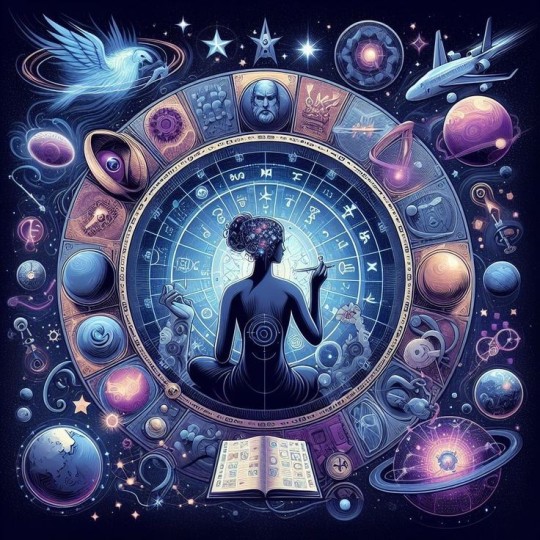
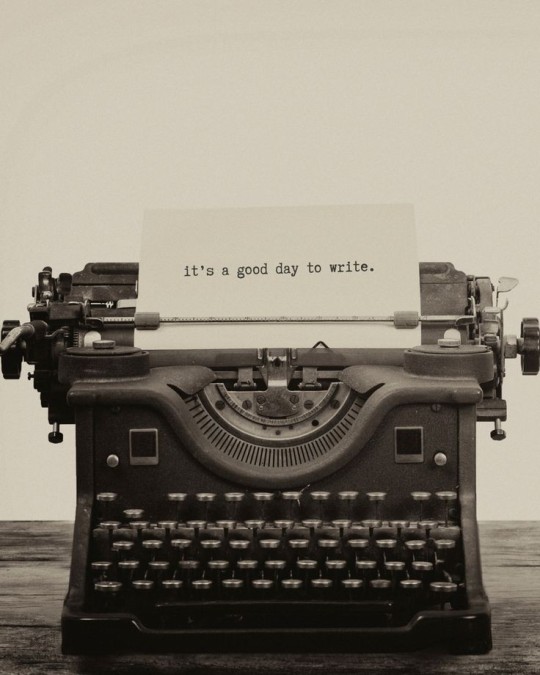
Information is from Chris Brennan's video on The Astrology Podcast YouTube channel on the topic of Mercury significations <3
Mercury: writing, speech, words, message, reign, translation, conveying, transmitting, information, interpretations, numbers, analysis, reasoning, details, dialogue, exchange, money, businesses, contracts, commerce, negotiating, indecision, disputation, questioning, doubts, distractions, speed, variety, irregularity, verstatility, changing, adaptability, flexibility, instability, inconsistency, knowledge, philosophy, service, teaching, mind, intelligence, intellect, language, communication, learning, poetry, voice acting, narration, acting, sharing, masculine, neutrality
Sun and Mercury:
Sun and Mercury are both centered around intelligence but in different ways; they complete each other. Sun is about divine knowledge and Mercury is about conveying, transmitting or communicating that knowledge or even perhaps analyzing it and extracting more wisdom as well as detail from it so I found this point particularly interesting. Sun illuminates with its rays and gives clarity by providing us with the truth and then Mercury expands on that truth and shares it with others in its charming versatile way as well
Sun vs Mercury sign:
Mercury does not move further than 28 degrees from the Sun meaning that the Mercury sign will always be the sign before or after the Sun sign (zodiacal signs are divided into 30 degrees) and so there is a bit of a differentiation (for lack of a better word) between who we are and the way we communicate and exchange information with other people if the Mercury and Sun signs are not one of the same. First example that comes to mind is having an Aries Sun Taurus Mercury and two people who are quite close to me have these placements; you would not know they were Aries Suns unless u asked hahaha even though one of them is an Aries rising too so that is something I wanted to note as well. Another example would be Sagittarius sun with Scorpio Mercury adding a lot of intensity to the person's communication style as well (which is something I relate to as you will see later on)
Domicile and exaltation:
Sooo Mercury rules over Gemini and Virgo so those are its domicile signs, it is how Mercury can manifest itself most comfortably whilst embodying its true essence. And then Mercury has its exaltation in Virgo as well which is pretty unique might I say and this gives me the vibes of (this my own way of seeing it so take it with a grain of salt) Mercury being more constructive in the sign of Virgo versus in Gemini just because of this particular distinction
But speaking of these two signs I do think they embody their Mercurial energies quite differently and shoutout to my friend @saturnianoracle for giving me the key words to describe this. First of all they are both analytic but Virgo is more of a skeptic I feel while Gemini tends to have more of an open mind. Virgo wants to see the evidence behind certain things to determine the merit or validity, to a certain extent, of the topics at hand to then decides if it wants to invest energy into looking into it more. It is very grounded as well as organized. With Gemini there is a certain sense of childlike curiosity that takes hold of this sign making it want to explore deep topics and of course stimulate its mind; it dives in without thinking and is more disorganized, inconsistent and chaotic I would say, and it loves conversing about its findings as well. I saw a tiktok video ancient astrology based describing Virgo and Gemini as the most intuitive signs which was fascinating to be honest u can watch it here
Detriment and Fall:
Mercury has its detriment in Sagittarius/Pisces and its fall in the sign of Pisces as well and the interesting thing noted in the video I watched (mentioned at the start) is that Sagittarius and Pisces are ruled by Jupiter, the biggest planet ruling over expansion and abundance, and with Mercury being on the smaller side you can really see that distinction of the Mercurial signs really often looking at the detail of things and well in contrast the Jupiter signs seeing the bigger picture. Also Jupiter being a benefic and ruling over luck makes me think that having these two placements is honestly not so bad tbh
Mercury in first house:
Mercury has its planetary joy in the first house of the self, highlighting the utmost importance of the curious, inquisitive and messenger qualities of the planet. What is interesting is the neutrality of Mercury and how we can link that with its joy being in the 1st house; a house that can be above or below the horizon, so even in this regard it stays neutral and does not "pick a side" if that makes sense; "acting as a bridge between the upper and lower hemispheres of the chart, a bridge between the celestial and terrestial realms which are united in the degree of the ascendant".
Source for the planetery joy information is Hellenistic Astrology: The Study of Fate and Fortune by Chris Brennan
I will make a more detailed post on planetary joys soon <3
Neutrality:
Mercury is not seen as a benefic or a malefic; it is considered a neutral planet. Of course, its manifestation and expression can be positive, negative or stay neutral depending on a few factors, such as:
Being in its domicile (Gemini/Virgo) or its exaltation (Virgo) sign is gonna lead it to manifest in a more constructive/beneficial way
Being in its detriment (Sagittarius/Pisces) or its fall (Pisces) sign would generally lead it to manifest in a less constructive way
Aspecting a benefic planet (Jupiter/Venus) would lead Mercury in this instance to manifest in a more constructive way as it is said to adopt the traits of benefic planet it is associated with
Being in a benefic ruled sign; meaning a Jupiter ruled sign as mentioned beforehand (Sagittarius Mercury, Pisces Mercury) or a Venus ruled sign (Taurus Mercury, Libra Mercury) would manifest in the same manner mentioned above
Aspecting a malefic planet (Mars/Saturn) leads Mercury to take on the traits of that malefic planet as well
Being in a malefic ruled sign so either Mars ruled (Aries Mercury, Scorpio Mercury) or Saturn ruled (Capricorn Mercury, Aquarius Mercury) leads us to Mercury adapting to that malefic's traits again
Triplicity also matters and I will make a detailed post on it soon but for now all I can say is that having Mercury in an air sign (Gemini, Aquarius, or Libra) adds on to the "power" that the Mercury placement has within the chart and the support that it gives to the native; if we are dealing with a day chart then Mercury has moderate support in the air sign in question (Saturn being its triplicity lord), and if it is a night chart then it maintains a powerful position within the chart, being its own triplicity ruler. (Source for triplicity rulership intormation is Ancient Astrology: in Theory and Practice: A manual of Traditional Techniques, Volume One: Assessing Planetary Condition by Demetra George)
That is all!! I wanted to go into more detail tbh but time simply does not allow it these days as I have my internship going on as well but I hope this was informative haha
Thank you for reading <3
Masterlist
Paid readings open
185 notes
·
View notes
Text
Whole Signs v Placidus - which house system is better?

Ah yes, ye age olde debate... which house system to use?
When first getting into astrology, the majority will use the placidus house system whether or not they know it. Placidus is the default for modern/ pop astrology; every chart generation website automatically uses it. Nowadays, the most common runner up house system to placidus is Whole Signs (often used by traditional/hellenistic astrologers). Yet, there are many house systems...:
➔Whole signs ➔Placidus ➔Koch ➔Equal/ Equal (MC) ➔Porphyry ➔Regiomontanus ➔Morinus ➔Alcabatius ➔Campanus ➔Meridian ➔Vehlow ➔Meridian
In this post, however, I will give my own argument on why I use whole signs and why I disagree with placidus. If you disagree with me thats fine, but I hope to at least educate on how these house systems even work and the deeper meaning behind why using whole signs is improtant.
»»-------¤-------««»»-------¤-------««»»-------¤-------««
First, how does Placidus work?
The ascendant (as well as the dsc, mc, ic) is a mathematical point based on the on the sign on the Eastern horizon. Placidus works by marking the cusps of the houses into two-hour intervals starting from the time of your birth. This is then pushed every 2 hours for the 12th 11th 10th 9th 8th and 7th house cusps ( because by the 7th house cusp it has completed 6/6 of its daily solar arc ) and then mirrored for the houses below (already an...interesting method). It is a quadrant system.
How does Whole Signs (WS) work?
Whole signs is not a time based system like Placidus. Whole signs split the houses into equal 30 degree segments, much like how the zodiac signs are split, so each house is equal in size and all the signs start at 0 degrees. The ascendant point, MC, IC, and DC float within the house instead.
Main issues:
Historical
➥The maths for this was laid out by Ptolemy for the purpose of understanding primary directions, of which most people now believe was actually used to predict lifespan - not for a house system. And then eventually an astrologer called Abraham ibn Ezra interpreted Ptolemy's works as a house system which Placidus then came along and validated. ➥During the 17th century British astrologers took this and ran. The Church did not like Placidus' works and so the astrologers essentially pushed the system as revenge against the Church/a big F you to them, making it the popularised system to use. This sacrified accuracy. Placidus rests on a foudnation not even designed to be a house system in the first place which creates a lot of problems as we will see below. P.S. I would HIGHLY recommend reading this article on the popularisation of placidus for a more indepth, better explanation.
Functional
➥Placidus simply falls apart at extreme latitudes (which people ARE born at). Take this chart for example:

Is everyone born at extreme latiudes suddenly inherently special for having such a chart where the houses are so vastly unequal and inutile in size? How does one go about interpreting the significance of this? Houses are literally swallowed up/duplicated or are massive or tiny. Just because your houses might not change so much in WS or placidus does not mean its still valid - a house system has to work for everybody universally. In WS however:

This works and makes SENSE. It is not an issue of being able to interpret the so-called intercepted house (which placidus has the issue of as the maths for it was never intended to be a house system in the first place) or not, it is about being accurate in how to read a chart. ➥Notice how in the placidus chart it appears the ascendant is in the 12th house. This is another visual issue with placidus, for instance apps like CoStar will even tell you that your ascendant is in the 12th house... Placidus or not though the ascendant is always in or at the first house, the ascendant can never be in any other house - the 1st house is literally YOU. The cusps just looked messed up because of the intercepted houses. And chart generating platforms like CoStar relying on placidus mess up even further...
➥ Intercepted houses mean a sign/s is "swallowed up" and doesn't influence any house cusp, which contradicts the principle that every zodiac sign has a clear role in the chart (every house and sign matters whether or not a house is empty etc). The idea that a sign is somehow blocked or inaccessible is untrue, whether or not you think it relates to you (certain aspects in your chart for explain that feeling when read properly rather than this, either way astrology does not care about how you feel or how you wish your chart was; many people get upset that their sun sign moves from the 5th to 6th house for example in WS).
══✿══╡°˖✧✿✧˖°╞══✿════✿══╡°˖✧✿✧˖°╞══✿══
Rebutting common arguments for placidus
"Whole signs doesn't take into account the rotation and curvature of the earth!"
✣First, as explained above, WS houses remain consistent regardless of the observer's latitude, avoiding the distortions and inaccuracies systems like Placidus introduce, particularly at extreme latitudes. WS houses rely on the zodiac's natural, unchanging divisions, which are independent of the Earth's curvature and geographic location (as explained in this post), providing consistent and straightforward house boundaries. ✣WS matches the universe's system. The signs, and therefore the houses are all about the sun rising from zero (its declination/ going from 0 degrees of whatever sign up till 29 and into the next) as the system follows every 30 degree section of the ecliptic , and correlates with the length of the sign's period. If the ascendant involves the ecliptic meeting the horizon , the ascendant point is a specific coordinate that is located within the first house whose cusp starts at 0 rather than marking the beginning of the cusp. Why should the house system not match what is going on above from which we observe and practise.
"Why not a time-based system if astrology is all about predictive techniques and seems so time sensitive?"
✣ Time doesn't exist in space in the same way it does here, time is just our tool to pinpoint moments against a measurement from which we can organise things (generally speaking). Time is, however, crucial for predictions only in how translate what happens up there to below, less so for diving the sky which is basically already divided for us. ✣ Time-based divisions, like placidus, introduce unnecessary complexity without adding real astrological value, as the essential qualities of the houses are fully captured by the zodiac's natural 30-degree segments in WS anyway as explained above.
"The MC and IC cannot be in houses which are not 10th and 4th!"
✣ Yes they can, this is quite straightforward. In WS, the IC can be in the 2nd-6th house and MC in 8th-12th (extremely rarely it can be in the 1st/7th house too). It is a floating mathematical point (like the asc and dsc) and does not mark the beginning of the 4th house and 10th house cusps like in Placidus. ✣ This is because the MC is the point where the sun culminates at its highest position in the sky at a given location, corresponding to the local meridian. The IC is directly opposite, marking the lowest point below the horizon. The MC and IC are not tied to the zodiac signs but are based on the intersection of the ecliptic (the Sun's apparent path) with the meridian line of the observer's location. This intersection varies based on the time of birth and latitude, and these points can occur at any degree of the zodiac. Because WS houses are aligned with the zodiac signs and the MC/IC are specific points along the ecliptic, the MC and IC can fall at different degrees that don't align with the 10th and 4th house cusps. ✣ This adds more nuance to readings. For instance, if the MC is in the 9th house instead of the 10th, it might indicate that one's career/public life/legacy/how they come off is strongly influenced by 9th house themes like higher education, travel, or philosophy. Thus, they add more information to how 10th and 4th house themes manifest. ✣ Here is a must-read article if you want more information (thorough analysis of MC/IC through the houses) on this topic: Patrick Watson- What To Do When the Midheaven Is Not in the 10th Whole Sign House.

Ending thoughts
People find it difficult to move on from placidus because they think their placidus charts makes complete sense/they resonate deeply with it/ they simply prefer their house placements in placidus to WS. All this is because of, for lack of better wording, a skill issue. You think it makes more sense but thats because you don't actually know how to properly delineate a chart - end of. And that's fine, astrology is complex and interpretation requires a lot of practise and deep study, especially into hellenistic works for a richer understanding of astrology.
Using placidus makes readings and your understanding of astrology unnecessarily complex and undermines the true art of chart intepretation, allowing for pop astrologers to import their own 'psychological' analysis, for instance, onto you via astrology - a deep misuse. Astrology has never been about psychologically explaining yourself - it is a map of your entire life of which you will not always 'relate' to, especially at different points in your life because those energies simply won't be pertinent/obvious when we are 5 vs 50 for example. I have spoken about the problems of using "resonating" to determine the accuracy of your astrological studies in my introductory post already, but it is a point which keeps needing to be re-emphasised.
The Whole Sign system is the oldest of all house systems, used effectively by ancient astrologers for thousands of years. It provides consistent and reliable results, particularly in predictive work, without the unnecessary and inaccurate complications introduced by varying house sizes and interceptions. If you want to use profection charts for instance, or many other traditional techniques, placidus will not work.
Placidus (as well as modern rulerships and the ABC house system which I will make posts on later) will take a while to unlearn - it certainly took me a long time to adjust out of the grips of modern pop culture's inaccurate and misleading yet addictive astrology. This is okay. But at the end of the day, wrong is wrong no matter how you try to justify it.
However, it is your personal choice. Posts like mine can only hope to encourage you to explore the deeper layers of astrology. Things like WS can take a while to accept, or you may never accept it - but as long as you make that decision fully informed. Yours sincerely, an ex-Placidus user xoxo

#astroblr#astrology#whole signs#placidus#regiomantus#koch#equal houses#astro notes#astrology observations#astrology masterlist#house systems#tropical astrology#astrology transits#astro observations#hellenistic#hellenistic astrology
185 notes
·
View notes
Text
Tropical vs Sidereal astrology
EDIT: UPON REFLECTION I'VE REALISED THAT I NEED TO BE MORE CLEAR WITH WHAT IM COMPARING HERE - IT IS NOT ABOUT VEDIC ASTROLOGY AS A WHOLE BUT THE SIDEREAL SYSTEM (WHICH IS ALMOST ENTIRELY SOLELY USED BY VEDIC ASTROLOGERS ONLY).
In my first post, I spoke a bit on how astrology works scientifically, and therefore why I use the tropical system. This post will go a little further into why, but I will re-paste the relevant parts from my first part here.
First, however, I would like to make it clear that when I am referring to Vedic astrology, I am referring to the common understanding of vedic astrology today which is the system which uses sidereal positioning. But Vedic astrology DOES NOT necessarily equal Sidereal. There are Vedic astrologers (though few, and will be expanded upon later) which use the tropical system. I am, however, using this post to explain why I do not use the Sidereal system. I am simply not proficient enough to talk about Vedic techniques and principles as understood removed from its popular Sidereal understanding. So to reiterate, this is not a post against Vedic techniques or Vedas and such, but why I do not follow how it is commonly perceived and practised today.


Sidereal vs Tropical rundown
✎ Sidereal astrology accounts for the precession of the equinoxes, i.e. it relies on where the actual constellations have moved to from our perspective on earth. If you use a sky map app and point it to the sky it will tell you the exact constellation above, that is sidereal positioning.
✎ Tropical astrology does not do this, it uses the divison of the ecliptic exactly how it was thousands of years ago of where the sun was at the vernal equinox - Aries. It is thus based on the seasons.
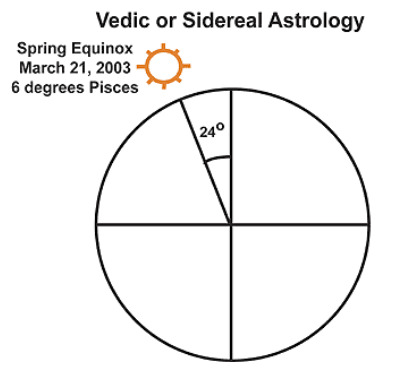
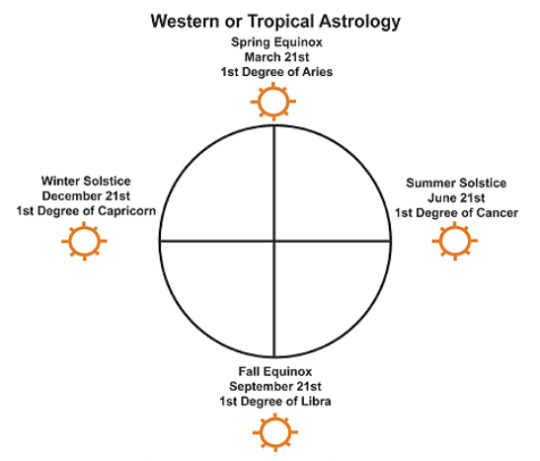
The science behind astrology - why constellations do not matter (excerpt form my main post):
: ̗̀➛ Astrology has NOTHING to do with the physical constellations. Astrology is based on the signs on the ecliptic (the path of the sun amongst the constellations, which is the plane of the earth's orbit).
: ̗̀➛ The equator has 15 constellations, and the ecliptic has 13. So why do we have 12 zodiac signs? This is because babylonians divided the ecliptic into 12 equal segments of 30 degrees each thousands of years ago. The ecliptic was divided into SIGNS. 12 constellations were just used to identify where in the sky each sign would be, at the time for ease of astronomical mapping/calculation - it is merely symbolic. This is why Opphiuchus is not the 13th Zodiac SIGN, although it is a constellation.
: ̗̀➛ Another reason why they are not based off the physical constellations is because the actual size of the constellations vary massively in size. Below is a representation of this:

: ̗̀➛ As you can see, Virgo, for instance is huge, and on a literal view overlaps into the next segment because the constellations do not all equally fit a 30 degree division. Yet, we do not give scorpio like 5 days for its season, because the physical constellation does not dictate anything meaningful.
This gives us the tropical zodiac, which is to do with the earth's seasons:

: ̗̀➛ The solstices are therefore reference points for Capricorn and Cancer (tropic of capricorn and tropic of cancer), not the constellations themselves. Accordingly, the spring equinox is marked by Aries (with the sun entering the segment of Aries at 0 degrees until 29), and the autumn equinox by Libra. Even though in the Southern Hemisphere, the sun entering Aries is an autumnal equinox, ithe fact remains it is still about the seasons (i.e. what the sun does, maintaining its universal application).
: ̗̀➛ The precession of the equinoxes, are therefore irrelevant to astrology (and this is why vedic/sidereal is, in my opinion inaccurate). The slow change of the direction of the earth's axial tilt, over around 26000 years, cause a precession of the equinoxes. This means, the segment of the sky that used to be identified by the Aries constellation from the earth's position at the time, is now looking at Pisces. But as we know, astrology has nothing to do with the physical location of the constellations. Vedic astrologers use sidereal positioning, aka taking into account the precession of the equinoxes, yet they still divide the ecliptic in the same way. This causes problems, leading to many branches in vedic because few agree on where aries actually even starts.
The problems with Sidereal positioning - its all about the sun!
✣ As described in my first post ( i'd really recommend u read it ngl lol), astrology is symbolic, and its entire foundation is based off the sun. It is the sun which gives us life -> therefore it represents our vitality, creativity, identity etc (as opposed to the rising sign which is our personality, who we are, etc and filtered through our chart ruler). Everything comes back down to this SOLAR-based system -> equinox to equinox. Nothing to do with the constellations.
✣ Moreover, the signs are grouped into the 3 modalities, which all represent the suns status (symbolic significations are interpretated separately depending on the sign but generally the groups represents what the sun is doing). The sign which it currently objectively is passing through bears no significance. E.g:
-> Aries, Libra, Cancer, Capricon = Cardinal = sun is crossing the equator when crossing Aries or Libra. When crossing cancer the sun is moving from setting north to south, and vice versa when going through Capricorn. Moving forward, fresh change. -> Taurus, Scorpio, Leo, Aquarius = Fixed = sun is in the middle of the season it is in, it is 'fixed' and maintaining. -> Gemini, Sagittarius, Virgo, Pisces = Mutable = sun is transforming by going through the end of its season, undoing and release before the next season starts with the cardinal signs.
✣ Because the position of the constellation depends on where on earth you view it from, there is no obejctive consensus on where Aries even starts. This had led to varying branches of sidereal astrology such as Lahiri, Raman, Krishnamurti Paddhati, and some western takes on Sidereal positioning like Fagan-Bradley. These branches are symptomatic of being overly pedantic by concentrating on the constellations themselves.
✣ Finally, Vic Di Cara is a famous and rare example of a modern day Vedic astrologer who uses the tropical system. Seems blasphemous, but he delves into some irrefutable points on ancient India's use of the tropical system which I will paste below but I really encourage you to read it. Tldr it is still about the sun (surprise suprise):
"The foundational texts of Indian Astrology unanimously and explicitly define the zodiac based on solstices and equinoxes (i.e. tropical). On the other hand, they also unanimously define the nakshatra based on stars (i.e. sidereal). The current difference between the two - the solstices (ayana) and their marker stars - is described as "ayanamsha." Problem: For many centuries Indian astrologers have applied ayanāṁśa to both the nakshatra and the zodiac - fuseing the two and divorcing the zodiac from its tropical anchors. Solution: Reform... which requires patience, clarity, contemplation and humility from all parties."
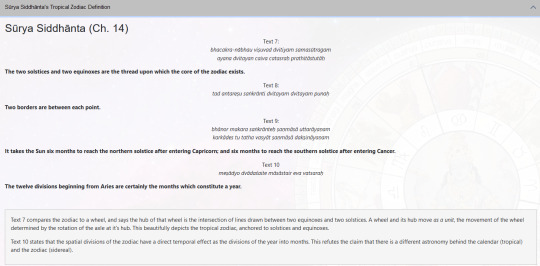
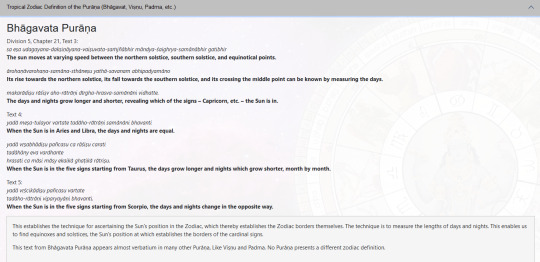



CRUCIALLY:
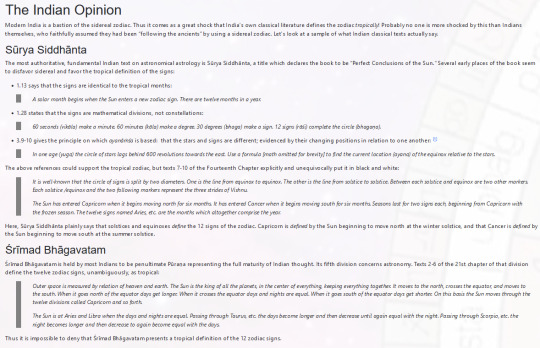


I hope this cleared up any confusions on sidereal vs tropical astrology, and has helped informed your decision on choosing which system to use! I will advise, though, not to mix the systems. This is a common belief for good reason; you would not mix two different languages in a sentence.
#astroblr#western astrology#vedic astrology#tropical astrology#tropical vs sidereal#sidereal zodiac#sidereal astrology#learn astrology#astro notes#astrology observations#astro observations#indian astrology#vedic#astrology masterlist
45 notes
·
View notes
Text
How to learn real astrology: what it is and is not
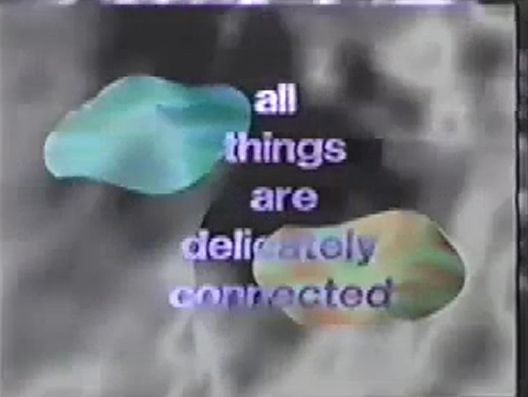
As above, so below, as within, so without, as the universe, so the soul.

It is VITAL that if you want to understand astrology properly, you come in with an open mind and forget everything you think you know. Especially, remove yoruself from the belief that astrology is some occultic mystical spiritual practice, and/or that it is solely some psychological tool.
I used to be quite the hater of astrology. None of it 'resonated', and it seemed like wishy washy hippie shit. In lockdown, astrology stuff kept coming onto my feed, and some of it made sense, but most still did not. I then initially wanted to debunk astrology. But when I properly stated looking into it, the deeper I went the more accurate it started to become. Equally, parts still remained highly inaccurate. But this was due to a mismatch of how 'influencers' out there synthesised and understood the traditional foundations of astrology and modern information. Thus, I committed myself to truly understanding astrology, and my life has significantly improved for it and I've only just started.
As an introductory post to what astrology really is, I have formatted it into the following sections: i. the problem with pop culture astrology, ii, the history of astrology, iii. how astrology works, and iv. where meaning in astrology comes from.

The problem with pop culture astrology
This is the type of astrology we see in newspaper horoscopes, online articles, tiktok viral posts, instagram horoscopes, etc.
This is borne out of the allure astrology holds for desperate individuals seeking an easy and quick answer to their life problems, and using it as a form of confirmation bias for hating their ex (for example). But this misuse of astrology will undoubtedly hit for most people, due to the barnum effect, but is ultimately inaccurate and those who think it true have now misleadingly correlated the pop culture reasons for why X happened to what astrology is.
The new moon in your 7th house is not a sign that your crush will leave his partner for you. Being a gemini sun does not mean you are a two faced, loyal-less individual. Having your sun sign the same as their venus sign does not mean you two are compatible. And so on and so forth.
Here are some key things to understand about astrology:
✎ Stop using co-star, and those websites which give you your astrology information like this:

-> This does not tell you anything remotely significant aside from standard archetypal and superifical meanings of having a sun in Sagittarius or whatever (which you might not even 'relate' to, because of a multitude of other factors this does not show). Your chart instead, should, at the very least look like this:
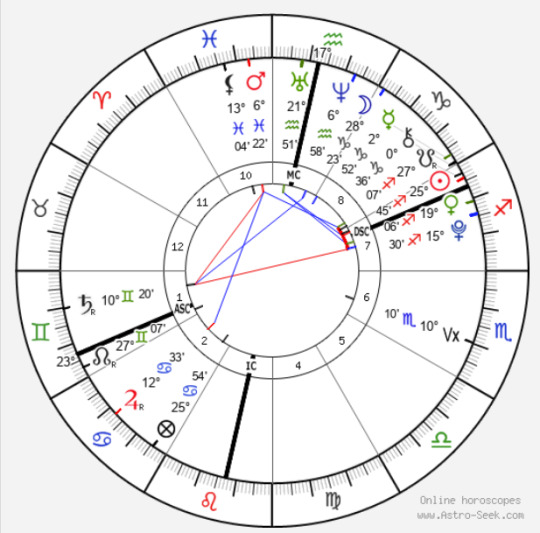
-> Even better, make a chart and add in decans, asteroids, and considers more aspects. Viewing your birth chart like this is essential for gaining a better understanding. Aspects are what brings everything in your chart together to give it more significant and individualised meaning, the houses and the angles are also explicitly identifiable this way. Also, always make sure your chart is in whole sign houses, I will make a post on this later on why, but you will have to go to settings for this as popculture astrology has made placidus the default (as well as other inaccurate takes).
✎ Sun sign is astrology is fake, no matter how much you think it resonates with you it is the wrong footing to base your understanding of astrology off of. Astrology is extremely complex, one thing might resonate for one person and not for another, because of house placements, condition of the planet, aspects to the planet, etc. Consequently, all basic and simplified delineations of a chart are unhelpful and will put you on the wrong footing for future proper readings you might wish to do. This is how astrology can be so inaccurate.
✎ Astrology is not about resonating. Although, this is a part of how we can test astrology, it is linked far too much with resonating with personality. Your birth chart is not a map of who you are specifically, we evolve all the time (as the universe, so the soul), it is a map of your entire life. It is a map of the sky and its energies the minute you were born. Some things you think you do not resonate with is because those energies have not yet played out in your life.
✎ Astrology is not a psychological tool, although it can give us insight into psychology when used and understood properly. Again, it is the blueprint of our life.
✎ Astrology is not spiritual. It is not a belief system, either. Although, one can use astrology to advance their spiritual practices.
✎ Free will exists. I will likely go into this in another post but the energies of our bith chart, solar return chart, profection year, progressed charts, transits etc, are merely indications of how things are likely to unfold. The energies are malleable within their themes' ambit, and it is up to us to decide how we choose to interpret what is/will happen and what to do with that information. A transit might indicate difficulty in a law suit, ok, how can I mitigate that then? What other charts, energies, and transits can I use? If I did not know of this then I would not know how to alter my behaviour to yield a better results, even if it might not mean a completely opposite result.
✎ Your natal chart will not show you everything. There are relocated charts, progressed charts, solar return charts, profection years, etc. All this goes into a holistic assessment. Your natal chart, however, will always remain the anchor of it all.
A brief history
Astrology is not some woo-woo, spiritual, new age, belief system. Astrology's history and use goes back to the Babylonians. It used to be intertwined with astronomy; Galielo and Kepler, for example, were simultaneously astrologers and practised it widely (even as court astrologers). People in positions of power have always consulted astrologers to time events, in the modern era many Royal families, celebrities, and politicans still consult astrologers. Carl Jung, JP Morgan, Nancy Reagan, and Roosevelt are examples of this. Of course, it might be argued that just because famous people have used/use astrology does not give it any more credit to which I say: ok please read my post below pls and ty xo.
Astrology's history has been relatively tumultuous, however. I have condensed this timeline from an article I found below:
- Astrology was a widely accepted practice but, in Europe, after the fall of the Roman empire and much of Europe, it fell into decline along with other disicplines. - The middle ages saw a renaissance of intellectualism with a particular focus on science and thus the astronomy part of it. This was largely due to the Church who viewed astrology as divination and going against free will. - However, in other parts of the world astrology was still a crucial element of daily life, and those in power would use astrologers to time events. - Astrology did re-enter the curriculum, though, in the 14th century, with a focus on being used for medical astrology in part due to the recently available Hippocratic Corpus. These texts were crucial to advancing our understanding of medicine, but Hippocrates emphasised that "a physician without knowledge of astrology has no right to call himself a physician". Astrologer still had a healthy dose of criticism back then, though. - Astrology was a major field of study in universities in Europe, well ingrained in daily life. - It died out in the 17th century, mostly due to the increasing emphasis on science being increasingly and misleadingly viewed as separate from astrology, the church, and astrologers falling into disrepute due to political involvement. - Its resurgence in the 19th century saw an oversimplified, and largely 'spiritualised' version of astrologer. This is because this period also saw an increased interest in the occult and mystic. - Since becoming conflated, astrology has become even further diluted, but this is not to say that every new discovery has been wrong; modern interpretation is crucial to informing the bigger picture of astrology and how we can utilise it. But it is vital to be critical and separate it from pop culture nonsense, aimed at lost and desperate people looking for quick answers and confirmation bias, and have some media literacy.
So, how does astrology work?
: ̗̀➛ Astrology has NOTHING to do with the physical constellations. Astrology is based on the signs on the ecliptic (the path of the sun amongst the constellations, which is the plane of the earth's orbit).
: ̗̀➛ The equator has 15 constellations, and the ecliptic has 13. So why do we have 12 zodiac signs? This is because babylonians divided the ecliptic into 12 equal segments of 30 degrees each thousands of years ago. The ecliptic was divided into SIGNS. 12 constellations were just used to identify where in the sky each sign would be, at the time for ease of astronomical mapping/calculation - it is merely symbolic. This is why Opphiuchus is not the 13th Zodiac SIGN, although it is a constellation (and has always been known).
: ̗̀➛ Another reason why they are not based off the physical constellations is because the actual size of the constellations vary massively in size. Below is a representation of this:
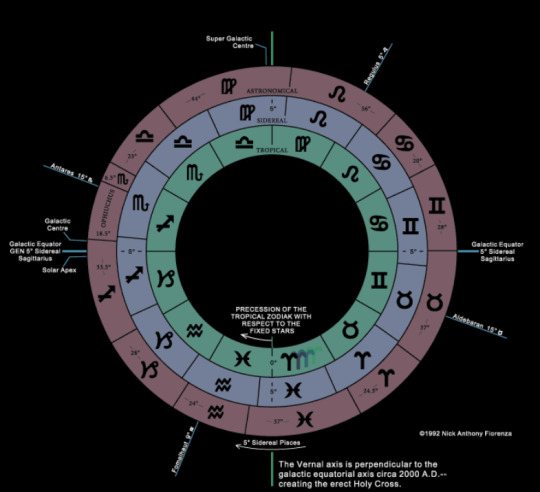
: ̗̀➛ As you can see, Virgo, for instance is huge, and on a literal view overlaps into the next segment because the constellations do not all equally fit a 30 degree division. Yet, we do not give scorpio like 5 days for its season, because the physical constellation does not dictate anything meaningful.
This gives us the tropical zodiac, which is to do with the earth's seasons:
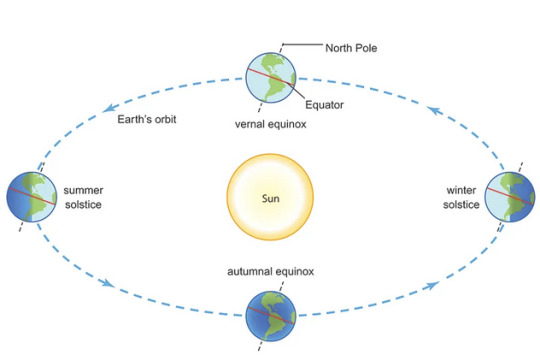
: ̗̀➛ The solstices are therefore reference points for Capricorn and Cancer (tropic of capricorn and tropic of cancer), not the constellations themselves. Accordingly, the spring equinox is marked by Aries (with the sun entering the segment of Aries at 0 degrees until 29), and the autumn equinox by Libra.
: ̗̀➛ The precession of the equinoxes, are therefore irrelevant to astrology (and this is why vedic/sidereal is, in my opinion inaccurate). The slow change of the direction of the earth's axial tilt, over around 26000 years, cause a precession of the equinoxes. This means, the segment of the sky that used to be identified by the Aries constellation from the earth's position at the time, is now looking at Pisces. But as we know, astrology has nothing to do with the physical location of the constellations. Vedic astrologers use sidereal positioning, aka taking into account the precession of the equinoxes, yet they still divide the ecliptic in the same way. This causes problems, leading to many branches in vedic because few agree on where aries actually even starts. But, I will write an extension of this segment in a future post on tropical vs vedic/sidereal astrology.
Where does astrological meaning come from?
As explained above, constellations do not give us meaning, the planets in the signs do (of which the signs' names just derive from where the constellations were at the time, i.e. are merely symbolic).
Astrology operates in a heliocentric context, in that its setting is derived from the solstices (as the sun is what gives us life) and the ecliptic etc, but is geocentric in function in that the meaning comes from how the celestial bodies going through the signs affect us on earth; it is all about OUR relation to the planets, not constellations.
Returning to the quote above (as above so below...), what happens up up there reflects its energies down on us below. For thousands of millenia, astrologers have developed an accurate pattern recognition framework which aligns with the maths and astronomy. This was done using the ephemeris, which tracked the trajectory of celestial bodies against the context of worldly (mundane), or natal events. Eventually, this knowledge could be used for predictions, (to understand transits, or for electional and horary astrology), by utilising the knowledge of how the trajectories of the planets and their interactions with eachother in what sign and house affected what.
Why does it affect us? Well, all the things that happen above us radiate energies. But when I talk about energies, I do not mean it in some spiritual sense, it is quite literal. Everything has frequencies. As mentioned above, astrologers, since the Bablyonian times, have studied these patterns and created an objective framework to align with it. Physical energies or not there is direct causation. The moon for instance, affects the tides on the planet because of its gravitational pull. We are 70% water, there is little reason to deny that the moon cannot affect us either (it does). Perhaps you might understand your broken leg as because of being hit by a car. But astrology can assess the chart of the event, and transits to your own chart to provide further explanation of why you got hit by a car in the first place, and why it caused a broken leg etc. Subsequently, the energies of what happens above relate to the themes found in planets, signs, houses, aspects, asteroids etc - but these energies are not set in stone as explained above.
Ultimately, it is disappointingly small-minded to think that there is nothing 'greater' than the physical reality we tether ourselves to. We are in fact part of something bigger; and again I do not mean this in some culty spiritual hippy sense. It is literally a fact, the world and cosmos at large is so vast, mysterious, and beautiful, how could anyone deny the interconnected web we are all collectively a part of. We might never fully understand the mechanisms of the universe, but what we can do is use the information we do have to make use of it and help inform us on how to live better lives. The fact there is something 'greater' inherent in our lives, connecting everything, which is objectively difficult to truly grasp, is not a reason to reject it. A lot of people who are averse to astrology (which used to be me) are those who pride themselves on rationality and objectivity, yet are restricting themselves to a very particular interpretation of what rationality and objectivity means.

With all this said, I hope it has helped someone understand and appreciate astrology better. There is such a fascinating rich and deep history to it, spanning various cultures and eras, making it difficult to at least not enjoy learning about even if one still chooses to not practise it. I would like to reiterate, however, that to truly embrace astrology and its millenia of knowledge, evidence, and practice behind it, one must divorce its concept from pop culture astrology.

#astrology#introduction to astrology#vedic astrology#western astrology#tropical astrology#astroblr#whole signs#astronomy#aries#taurus#gemini#cancer#leo#virgo#liba#scorpio#sagittarius#capricorn#aquarius#pisces#1st house#4th house#5th house#7th house#8th house#12th house#astrology observations#astro notes#astro community
178 notes
·
View notes
Text
⋆⁺₊⋆ ☀︎ ⋆⁺₊⋆THE 9TH HOUSE⋆⁺₊⋆ ☀︎ ⋆⁺₊⋆

Welcome to my blog...aka the 9th house! I've named it this as my chart ruler, mercury, is in my 9th house which represents many important themes in my life . I am very saturnian, however; saturn is conjunct my ascendant, and my chart ruler's ruler is also saturn (mutual reception b/w my merc and saturn and they also trine lol)- hence my username ♥ ✭∞∞∞∞✷∞∞∞∞✭ So essentially, I've decided to finally make a place to info dump all the word vomit I hoard in my head; ramblings, vents, and most importantly - astrology stuff (my latest hyperfixation, especially since pluto entered my 9th house lol). So yeah, mostly a place to catalogue all that stuff for myself, but it would be nice to get to know other people in the tumblr community too.
ׂ╰┈➤ ✣ABOUT ME
◦ I started properly getting into astrology in 2023, after superficialy dabbling in it since 2021. What previously closed my mind off to ever taking astrology seriously was the garbage pop culture astrology permeating the internet, and its modern day linke and use as solely a psychological tool/personality descriptor (more of this will be disucssed in the first post). ◦ As I've been learning, I wanted to create a place to consolidate my thoughts, hence this blog. The information derives from an amalgam of different sources, and I will try to cite where necessary/possible. I consider myself a forever student, however, and it is still very much early days in my astrological knowledge. ◦ P.S. I use the tropical zodiac, whole signs, traditional rulerships, and practise by using a blend of traditional and modern techniques and ideas. All my information is taken from various sources e.g. books, reddit, tumblr, tiktok, discord, websites, youtube etc.
·̩̩̥͙*•̩̩͙✩•̩̩͙˚·̩̩̥͙*•̩̩͙✩•̩̩͙˚·̩̩̥͙*•̩̩͙✩•̩̩͙˚·̩̩̥͙*•̩̩͙✩•̩̩͙˚·̩̩̥͙*•̩̩͙✩•̩̩͙˚·̩̩̥͙*•̩̩͙✩•̩̩͙˚·̩̩̥͙*•̩̩͙✩•̩̩͙˚·̩̩̥͙*•̩̩͙
Just for fun, I have a:
ׂ╰┈➤ ♓️☉, ♍️☽, ♊️ rising, ♒️☿, ♓️♀︎, ♈️♂︎

⋆⁺₊⋆ ☀︎ ⋆⁺₊⋆ASTROLOGY MASTERLIST⋆⁺₊⋆ ☀︎ ⋆⁺₊⋆
Introduction to astrology:
✦ How to learn real astrology - astrology as an observable science; what it is and is not.
✦ Tropical vs Sidereal astrology - why I use tropical
✦ Whole signs vs Placidus house system - why I use whole signs
✦ Traditional vs Modern rulerships - why I use traditional
✦ Why using the ABC house system limits your learning (and is inaccurate)

The foundations of chart interpretation:
✦ Primary qualities, Elements, and Tempraments ✦ The planets and the 12 zodiac signs
✦ The houses (angular,succedent, cadent)
✦ The houses (1 - 12)
✦ How to interpret empty houses
✦ Modalities
✦ The nodes
✦ Aspects (major and minor)
✦ Essential dignities

Delineation:
✦ How to read and interpret chart transits

Astro ramblings:
✦ Pop astrology pains me + resources to explore hellenistic astrology
#astroblr#western astrology#traditional astrology#modern astrology#astrology masterlist#hellenistic astrology#vedic astrology#astro notes#astrology post#long reads#long posts#aries#taurus#gemini#cancer#leo#virgo#libra#scorpio#sagittarius#capricorn#aquarius#pisces#astrology observations#astro placements#astrology transits#horoscope#astrology
67 notes
·
View notes
Text
⋆⁺₊⋆ ☀︎ ⋆⁺₊⋆ABOUT ME⋆⁺₊⋆ ☀︎ ⋆⁺₊⋆

INTRO
✎ age: born in 2002
✎ pronouns: she/her
✎ sexuality: bi
✎ location: england
✎ cognitive functions/mbti: intp
✎ enneagram: 5w6
✎ ♓︎☉ ♍︎☽ ♊︎↑

ᐢ..ᐢ hobbies: reading, philosophy, travelling, listening to music, video games, hiking, history, mythology, geography, politics, languages/linguistics, psychology, collecting as much info on my interest as possible, films, staring into space and doing nothing
ᐢ..ᐢ top artists: lana del rey (top 0.5% bitch xo), deftones, radiohead, clams casino
ᐢ..ᐢ fave tv shows: adventure time, bojack horseman, avatar the last airbender, legend of korra, the owl house, sherlock, rick and morty, over the garden wall, david attenborough stuff/documentaries in general, TLOU, fleabag, invincible, atypical, haunting of bly manor, beef, arcane, bee and puppycat
ᐢ..ᐢ fave films: donnie darko, the fight club, requiem for a dream, lotr series, hp series, interstellar, inception, girl interrupted, parasite, dune series, eternal sunshine of the spotless mind, trainspotting, v for vendetta, stardust, narnia series, hereditary, a monster calls, everything everywhere all at once
ᐢ..ᐢ fave video games: hades, silent hill 2, resident evil 4, halo, night in the woods, the witcher 3, fran bow, little miss fortune, undertale, life is strange, TLOU, ni no kuni, stanley parable, the beginner's guide, detroit become human, horizon zero dawn, assassin's creed series, devil may cry 5, bayonetta, hellblade, cult of the lamb, black myth wukong, kcd2
ᐢ..ᐢ fandoms: basically all of the above plus: percy jackson, eragon,
if anyone got through those fat (and actually condensed) lists, then good job - i just took this an opportunity to list some of my favourite things so i don't forget and can look back lmao, which means i'll be updating it as more, hopefully cool, stuff comes out
#intro post#introduction#about me#astroblr#astrology#lana del rey#deftones#radiohead#fandoms#nerdy#about myself#about
5 notes
·
View notes